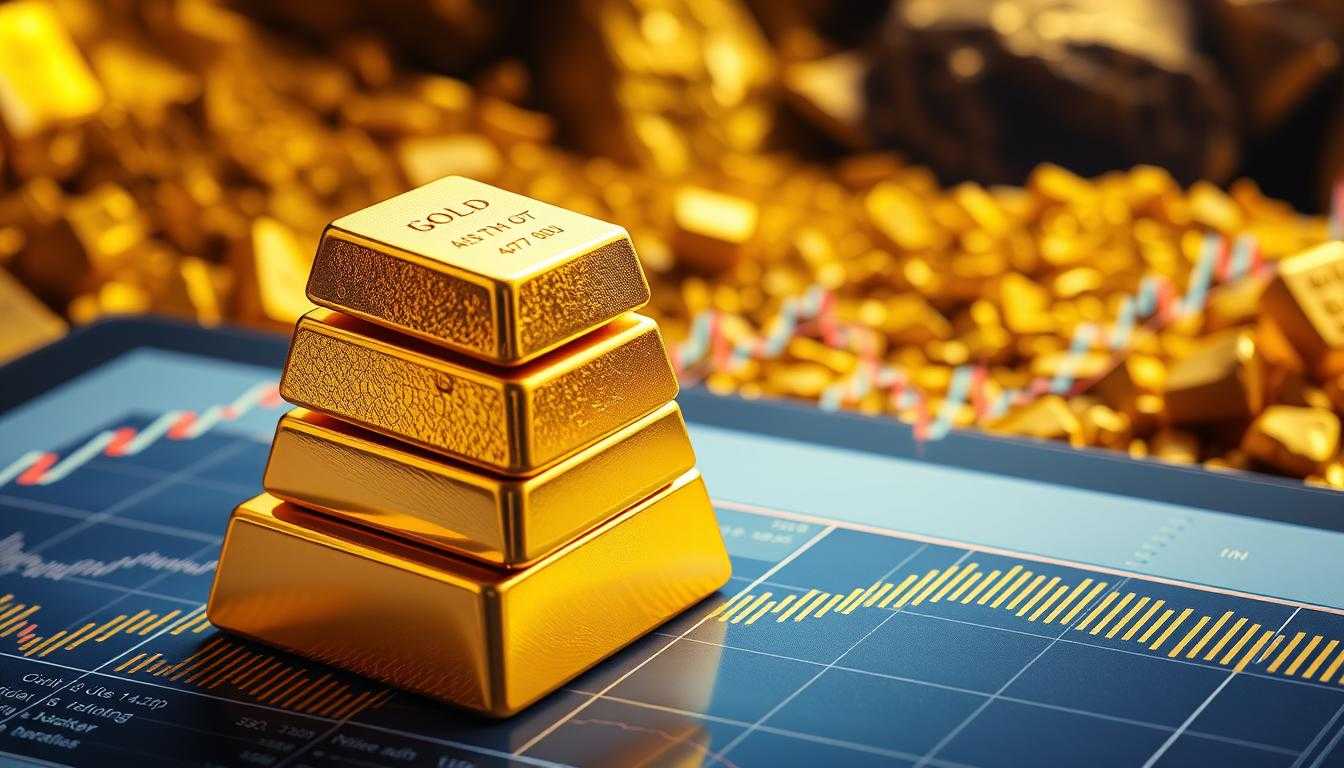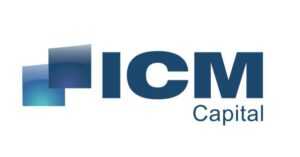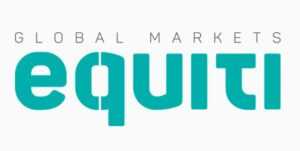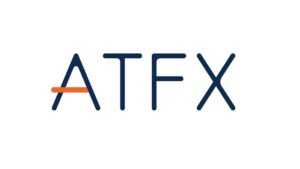“Gold is money. Everything else is credit.” – J.P. Morgan’s words are still true today. In the gold market, knowing how to analyze prices is key.
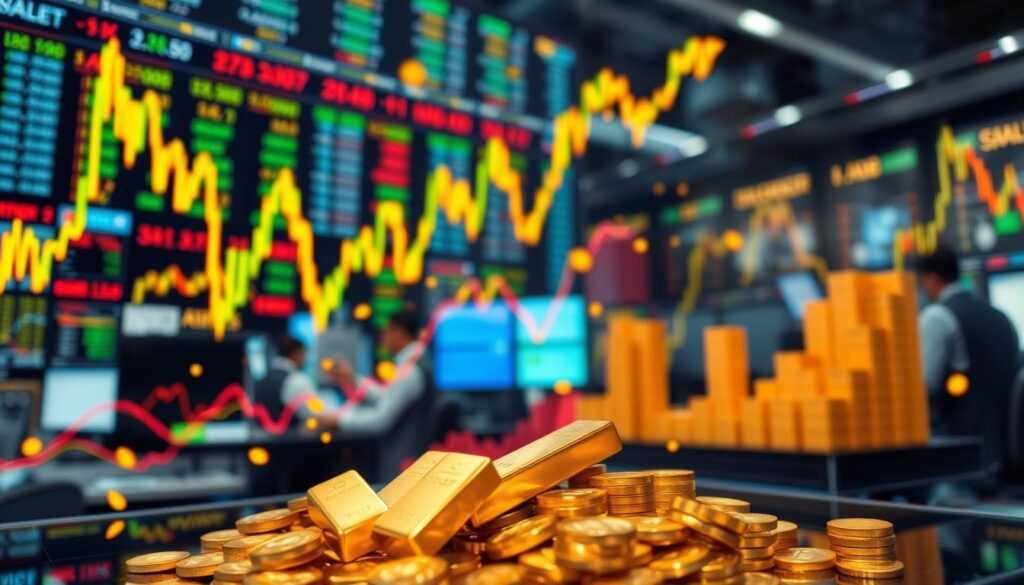
In the UAE, gold trading is booming. Prices have jumped nearly 20% at home and 30% abroad. This shows how important it is to track gold market changes well.
Gold is traded worldwide for over 14 hours a day. To do well, you must understand the roles of big players. Knowing about global events and market conditions is also crucial.
Want to start trading gold? Open an account with ICM Capital or Equiti. Both are global brokers with licenses from the UAE. They offer live gold trading for investors.
Key Takeaways
- Gold prices have seen remarkable performance, with up to 30% returns in international markets
- Major exchanges trade gold for over 14 hours daily
- Understanding key market participants is crucial for successful trading
- Staying updated on global scenarios and geopolitics is essential
- ICM Capital and Equiti offer regulated platforms for gold trading in the UAE
Understanding Gold Market Fundamentals and Price Drivers
Gold trading needs a deep understanding of market basics and what drives prices. Investors use fundamental analysis to figure out gold’s true value and guess future prices. Let’s look at key factors that affect gold prices and how they influence investor mood.
Central Bank Buying Patterns and Their Impact
Central banks are key players in the gold market. Big names like those in the USA, China, Turkey, and India are adding to their gold reserves. This buying affects gold prices a lot. For instance, when the economy is shaky, central banks buy more gold, boosting demand and prices.
⇒ Open your account now with ICM Capital and trade Live on Gold with a global multi-regulated broker and authorized by the Abu Dhabi Global Markets (ADGM) ⇐
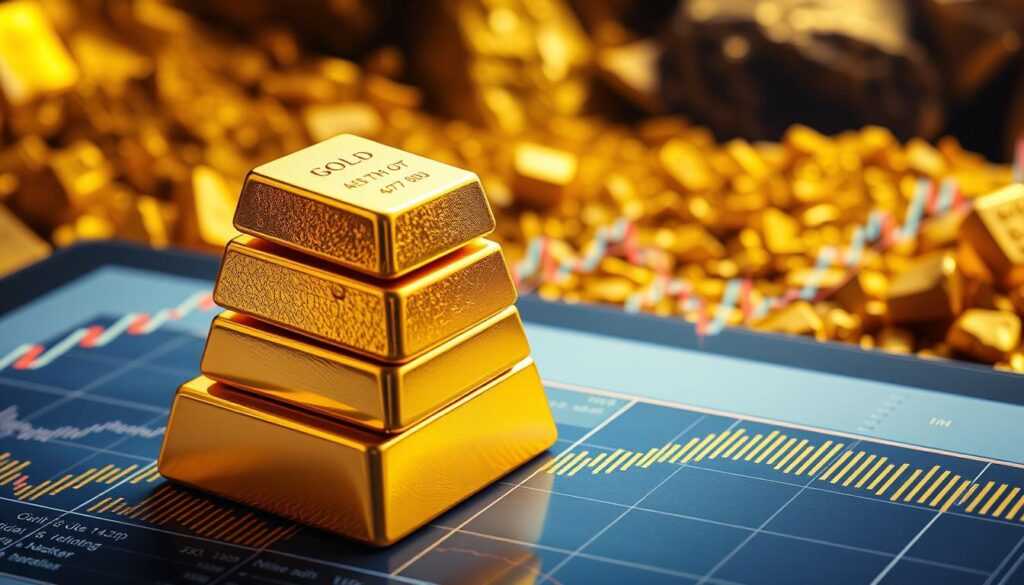
Global Economic Conditions and Market Sentiment
Gold shines when the economy slows down or goes into recession. In the 2008 financial crisis, gold prices soared as investors looked for safety while stocks plummeted. In 2020, gold prices jumped over 25% during the pandemic. These times show how global economic conditions influence investor sentiment towards gold.
Don’t miss out: ⇒ Blog ⇒ YouTube Videos ⇒ Telegram Channel
The Influence of Dollar Index on Gold Prices
The US dollar and gold usually move in opposite directions. When the dollar gets stronger, gold prices tend to drop. This link is key for traders on platforms like ICM Capital or Equiti to make smart choices. Knowing this helps predict gold price changes.
| Year | Event | Gold Performance |
|---|---|---|
| 2008 | Global Financial Crisis | Gained over 5% |
| 2020 | COVID-19 Pandemic | Returned over 25% |
| 2023 | Geopolitical Tensions | Increased by 45%+ |
Geopolitical tensions also greatly affect gold prices. When there’s conflict or uncertainty, gold’s appeal as a safe haven grows, often causing prices to rise. Traders on ICM Capital and Equiti should watch these factors closely to make smart trading moves in the ever-changing gold market.
Key Economic Indicators for Gold Trading
Understanding gold price changes is key for traders. They need to know how to read economic data. This knowledge helps them make smart trading moves.
Non-Farm Payroll Data Analysis
Non-farm payroll data is very important for gold prices. It shows how the U.S. job market is doing, excluding farm and some government jobs. A strong report means the economy is growing, which can lower gold prices.
GDP and Employment Statistics
GDP and employment stats tell us about the economy’s health. When GDP grows, gold prices often fall because people want to invest in riskier assets. But, if growth is slow, gold becomes more appealing as a safe choice.
Inflation Rates and Interest Rate Decisions
Inflation and interest rates greatly affect gold prices. Gold is a good hedge against inflation. So, when inflation goes up, gold prices rise. Interest rates work the opposite way: lower rates make gold more attractive because it doesn’t earn interest like bonds.
| Economic Indicator | Impact on Gold Prices | Frequency of Release |
|---|---|---|
| Non-Farm Payroll | Strong report: Price decrease Weak report: Price increase |
Monthly |
| GDP Growth | High growth: Price decrease Low growth: Price increase |
Quarterly |
| Inflation Rate | High inflation: Price increase Low inflation: Price decrease |
Monthly |
| Interest Rate | Rate hike: Price decrease Rate cut: Price increase |
As announced by central banks |
Knowing these economic indicators is crucial for gold trading success. Open your account now with ICM Capital or Equiti. Trade gold live with global brokers authorized by Abu Dhabi Global Markets (ADGM) and the Securities and Commodities Authority of the UAE.
⇒ Open your account now with ICM Capital and trade Live on Gold with a global broker who holds international licenses and is authorized by the Abu Dhabi Global Market UAE
⇒ Open your account now with Equiti and trade Live on Gold with a global broker who holds international licenses and is authorized by Securities and Commodities Authority of the UAE.
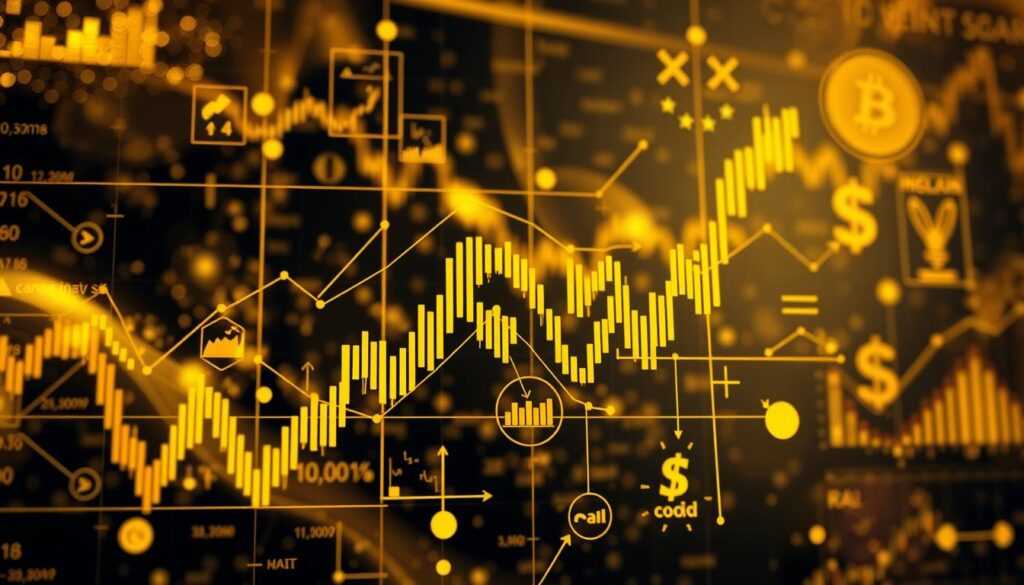
Technical Analysis Tools for Gold Trading
Gold trading needs a sharp eye for market trends. Technical analysis tools help traders make smart choices in the volatile gold market. Let’s look at key techniques to boost your gold trading strategy.
Understanding RSI (Relative Strength Indicator)
The RSI indicator is a strong tool for checking gold price momentum. It ranges from 0 to 100. An RSI over 70 means gold is overbought. Below 30, it’s oversold. Traders use this info to decide when to buy or sell.
Support and Resistance Levels
Finding support and resistance levels is key for gold trading success. These levels are like invisible walls where prices often stop or change direction. Knowing these points helps predict price movements and plan trades.
Moving Average Strategies
Moving averages smooth out price data to show trends. Simple Moving Averages (SMA) and Exponential Moving Averages (EMA) are favorites for gold traders. When gold prices go above the moving average, it often means an uptrend, suggesting buying opportunities.
| Technical Tool | Function | Trading Signal |
|---|---|---|
| RSI | Momentum Indicator | Above 70: Overbought, Below 30: Oversold |
| Support/Resistance | Price Level Analysis | Potential Reversal Points |
| Moving Averages | Trend Identification | Price Above MA: Uptrend, Below MA: Downtrend |
Using these technical tools can greatly improve your gold trading results. Remember, successful trading mixes technical insights with fundamental analysis of market conditions. Open your account now with ICM Capital or Equiti to trade gold with globally regulated brokers in the UAE.
“Open your account now with ICM Capital and trade Live on Gold with a global broker who holds international licenses and authorized by the Abu Dhabi Global Market UAE.”
“Open your account now with Equiti and trade Live on Gold with a global broker who holds international licenses and authorized by the Securities and Commodities Authority of the UAE.”
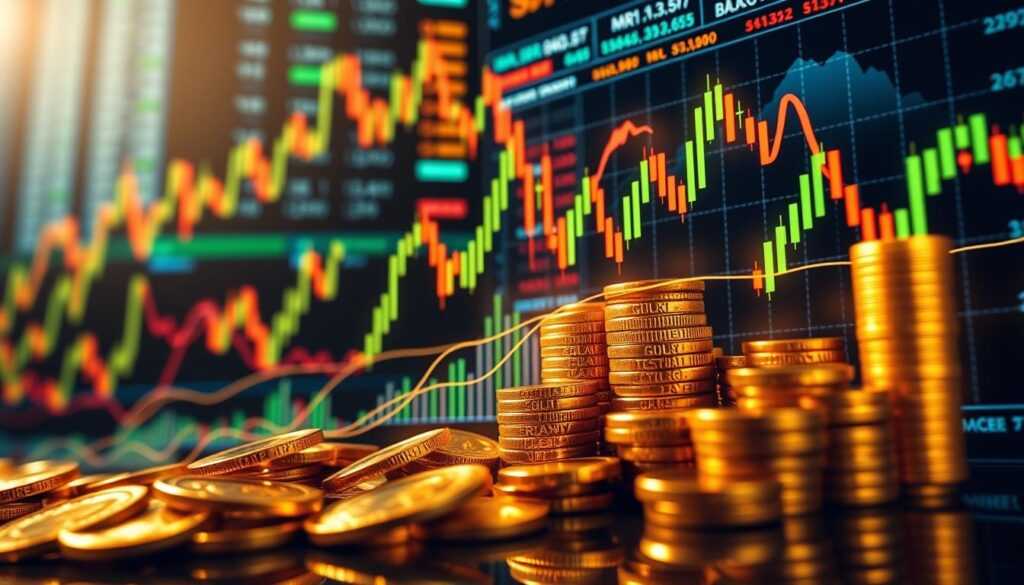
Gold reached around $2790 per ounce on October 31, 2024, setting new record highs amid global uncertainty.
Keep up with market trends and use these technical tools wisely to effectively navigate the gold market.
Risk Management in Gold Trading
Mastering risk management is key to success in gold trading. As you explore the gold market in Dubai, using effective strategies is crucial. These strategies help protect your investments. Let’s look at some important techniques to keep your trading safe.
Setting Effective Stop-Loss Orders
Stop-loss orders are essential for managing risk. They close a position when the price hits a set level, capping losses. Using trailing stops can secure profits while reducing risks. It’s wise to risk only 1-2% of your capital on any trade.
Position Sizing and Portfolio Allocation
Proper position sizing is vital in gold trading. It’s about how much capital you put into a single trade. Avoiding over-investing is key. Diversifying across different assets can also reduce risk.
Spread your investments across commodities, stocks, or bonds. This balances your portfolio. It helps soften the blow of market ups and downs.
Leverage Management Techniques
Leverage in gold trading can boost profits but also increase losses. Use it wisely and understand its impact on your strategy. Keep an eye on market conditions and economic reports.
Geopolitical tensions and central bank policies also affect gold prices. By using these strategies, you’ll be ready to handle the gold market. Open your account now with ICM Capital or Equiti to trade gold with global brokers authorized by UAE regulators.
⇒ Open your account now with ICM Capital and trade Live on Gold with a global multi-regulated broker and authorized by the Abu Dhabi Global Markets (ADGM) ⇐
FAQ
How can I effectively monitor gold price fluctuations?
To keep track of gold prices, check major exchanges like Comex and MCX. Also, watch global economic news and central bank actions. Use tools like RSI and moving averages for analysis. Stay updated on Forexfactory.com and Investing.com for economic data.
What are the key factors influencing gold prices?
Gold prices are affected by central bank actions, global economy, and the US dollar’s strength. Geopolitical tensions and economic indicators like GDP also play a role. Market sentiment and investor behavior are crucial too.
How does central bank buying affect gold prices?
Central bank buying boosts gold prices. Banks like those in the USA and China buy gold as a safety measure. This increases demand and makes gold more valuable.
What is the relationship between the US dollar and gold prices?
Gold prices and the US dollar move in opposite directions. A strong dollar makes gold more expensive for non-US buyers. This can lower demand and prices.
How can I use the Relative Strength Indicator (RSI) in gold trading?
The RSI measures price movement speed. In gold trading, high RSI values mean prices might fall, and low values mean they might rise. Use this to spot potential price changes, but always check other analysis too.
What are some effective risk management strategies for gold trading?
To manage risks, set stop-loss orders and size your positions wisely. Diversify your investments and use leverage carefully. Always have a clear trading plan and avoid making impulsive decisions.
How do economic data releases affect gold prices?
Economic data, like job numbers and GDP, can greatly affect gold prices. Good data might make gold less appealing, while bad data could make it more attractive. This can change investor sentiment and prices.
What role do geopolitical tensions play in gold price movements?
Tensions, like conflicts in the Middle East, can push gold prices up. Gold is seen as a safe asset during uncertain times. When risks rise, investors buy more gold, increasing demand and prices.

